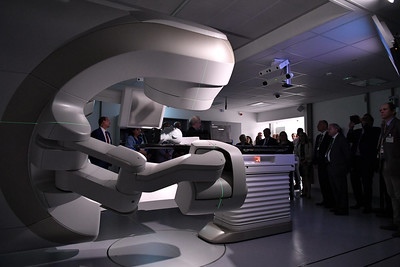
Cancer is a growing global health and development challenge, especially in Africa. Governments are under increased pressure to meet rising demands from cancer patients for a greater number of affordable high-quality services. Nuclear technology plays a vital role in cancer diagnosis and treatment, as well as other medical applications.
There are however challenges related to the life-saving nuclear technologies used in this sector: Some of these technologies that contain Cobalt-60 and Caesium-137 pose a safety and security risk and require cradle-to-grave management. Non-isotopic alternatives, such as linear accelerators and X-rays, do not have the security concerns of radiation sources but have many of the same safety related concerns. Some of these alternative technologies also need to be adapted for routine use in developing countries.
On 17 February 2021, the VCDNP held a virtual workshop on this complex topic with the aim to promote dialogue on the challenges to and opportunities for ensuring access to nuclear technology for human health, especially for cancer care. The workshop attracted over 100 participants from more than 40 countries including diplomats, international civil servants, medical practitioners, academics, representatives from nuclear and radiation regulatory bodies, and experts on nuclear safety and security. The VCDNP later published a fact sheet on the subject of the workshop.
The panellists during the workshop were:
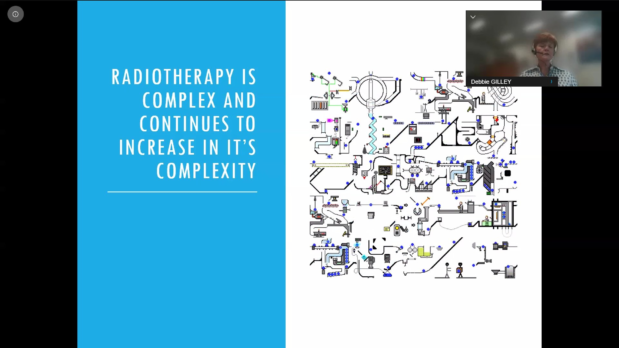
Dr. Gilley began the workshop with an overview of radiotherapy in Africa. She observed that, although cancer rates are increasing in Africa overall, this is indicative of a general increase in life expectancy naturally leading to a higher chance of contracting non-communicable diseases. Many of the issues faced by African countries relate to a lack of resources, where facilities are not built correctly or lack the proper equipment to ensure the safety of the patient and medical professional alike.
Dr. Gilley outlined six key building blocks to launching and maintaining a sustainable radiotherapy programme: proper infrastructure; suitable equipment; a focus on human resources and capacity building; access to financial resources; long-term planning; and regulatory oversight. She emphasised that these building blocks do not amount to a one-size-fits-all approach, but rather that these factors should be developed in consideration of country conditions. The IAEA supports its Member States in all aspects of cancer control and works closely with the World Health Organisation and with the support of contributors to the IAEA’s Peaceful Uses Initiative which includes Member States, the Bill Gates foundation and the Islamic Development Bank.
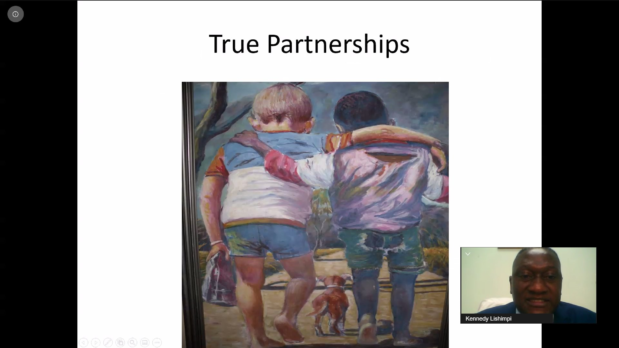
Dr. Lishimpi’s remarks focused on how Zambia established and developed its cancer control programme over the past years and laid out five key factors which were instrumental for Zambia: (1) political will to support a radiotherapy programme; (2) access to funding; (3) planning, including on how to allocate funding strategically; (4) strong partnerships nationally, regionally and internationally (the IAEA being a key partner); and (5) availability of training programmes locally.
As Zambia uses both Cobalt-60 teletherapy machines and linear accelerators for cancer diagnosis and treatment, Dr. Lishimpi outlined the benefits and drawbacks of each. For example, while Cobalt-60 machines consume less electricity and are cheaper to produce and maintain, they come with increased side effects from radiotherapy and inherent nuclear security concerns. Linear accelerators, on the other hand, are capable of supporting more complex treatments and do not require radioactive sources, but are expensive to procure and maintain. Moreover, linear accelerators are dependent on electricity, which is unreliable in many developing countries.
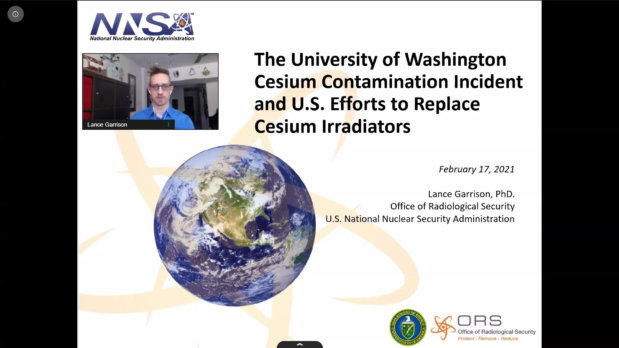 Dr. Lance Garrison focused his remarks on issues of radiological security, emphasising that security is an indelible part of any radiotherapy programme. While there has not yet been a case of use of a radiological dispersal device, or dirty bomb, even an accidental release of radiation presents complex and expensive challenges. In this regard, Dr. Garrison recalled the 2019 incident in the US when a caesium self-shielded irradiator was accidentally damaged during removal from a building at the University of Washington. While the spread of contamination was minimal in comparison to the source (one curie of the source was released out of 3000 curies), the remediation from the accident is projected to cost more than $100 million, which the US government had to cover.
Dr. Lance Garrison focused his remarks on issues of radiological security, emphasising that security is an indelible part of any radiotherapy programme. While there has not yet been a case of use of a radiological dispersal device, or dirty bomb, even an accidental release of radiation presents complex and expensive challenges. In this regard, Dr. Garrison recalled the 2019 incident in the US when a caesium self-shielded irradiator was accidentally damaged during removal from a building at the University of Washington. While the spread of contamination was minimal in comparison to the source (one curie of the source was released out of 3000 curies), the remediation from the accident is projected to cost more than $100 million, which the US government had to cover.
Dr. Garrison also noted the NNSA Office of Radiological Security (ORS) project that aims to replace caesium irradiators with X-ray machines as a non-isotopic alternative for blood irradiation. Since 2016, 161 caesium irradiators have been replaced in the US under the project, and a further 175 are in the process of being replaced. The ORS also provides support to countries who want to replace their gamma technologies with alternative technologies.
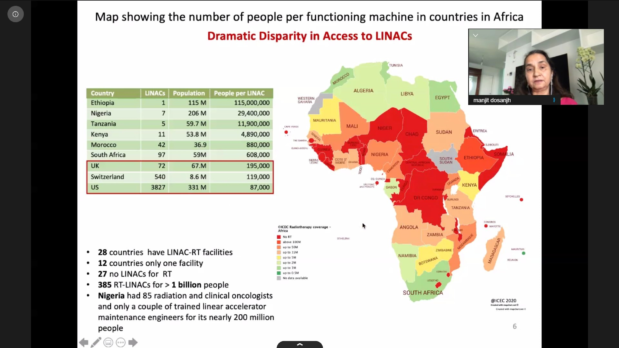
Professor Dosanjh drew attention to the disparity between developed and developing countries in access to linear accelerators during her remarks. This disparity is especially evident in Africa, where only 28 of Africa’s 54 countries have access to a linear accelerator, and the vast majority of those devices are located in three countries. She recalled many of the benefits and drawbacks of linear accelerators versus cobalt-60 machines mentioned by Dr. Lishimpi and emphasised that, for countries that are able support the use of linear accelerators, they offer better dose distribution and higher energy for more effective treatment.
However, these technologies must be adapted to be more robust, affordable, modular, reliable, and simple to use if developing countries are to benefit from them. To this end, the Smart Technologies to Extend Lives with Linear Accelerators (STELLA) project was developed to expand access to radiation technology by developing countries. Professor Dosanjh is the project leader of STELLA, a unique global collaboration involving some of the best physics and medical talent and expertise from leading laboratories in accelerator design. Importantly, STELLA also includes input and collaboration from users in Africa, other low- and middle-income countries, as well as high-income countries. Professor Dosanjh emphasised the importance of involving all stakeholders in the discussion from the outset when developing a cancer control programme including those from the “grassroots community.”
Following the speakers’ presentations a poll was conducted on the largest challenges and opportunities to ensuring access to peaceful uses of nuclear science and technology. In the opinion of poll respondents, limited financial and human resources is the largest challenge. Conversely, more dialogue between different stakeholders and groupings, and adapting technologies to developing country conditions provide the best opportunities for ensuring and expanding access to peaceful uses. The poll results are included below.
During the discussion the participants and speakers emphasised the importance of ensuring access to both gamma technologies and alternative technologies that are adapted to developing country conditions. There was general agreement that the recruitment, training and retention of skilled health care workers to operate these machines is essential to improving cancer diagnosis and treatment in developing countries. The importance of having champions at a national level to drive and sustain cancer control programmes was also highlighted.
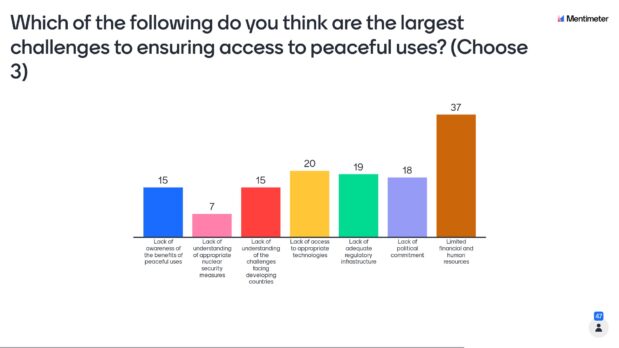
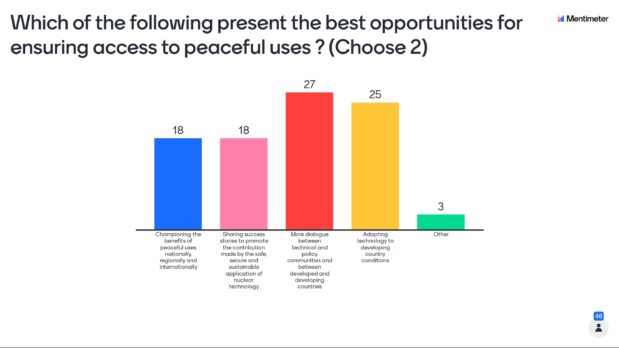
Featured image courtesy of Dean Calma / IAEA.

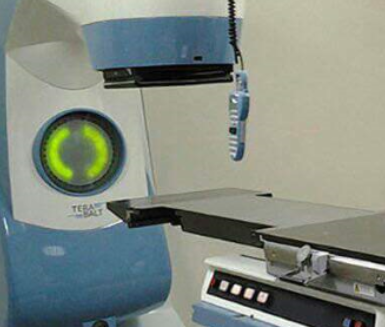
By continuing to use the site, you agree to the use of cookies. more information
The cookie settings on this website are set to "allow cookies" to give you the best browsing experience possible. If you continue to use this website without changing your cookie settings or you click "Accept" below then you are consenting to this.